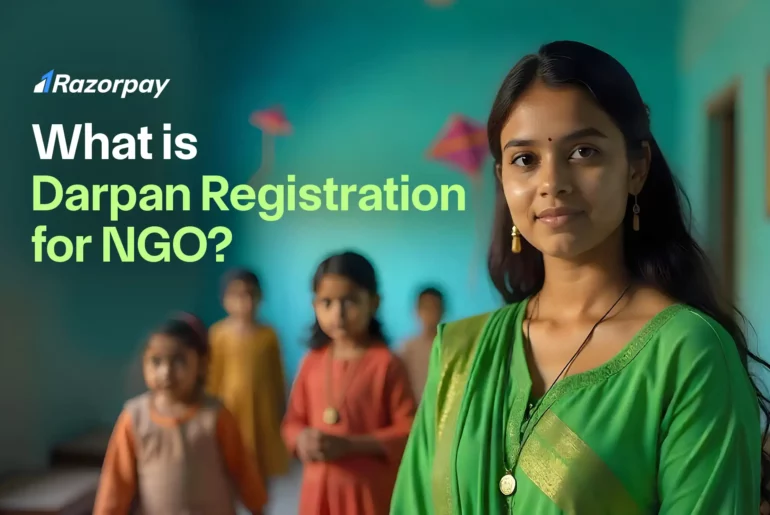Table of Contents
What is Darpan Registration?
Darpan registration is the online registration process for non-governmental organisations (NGOs) or voluntary organisations (VOs) on the NGO Darpan portal. By registering under Darpan registration, NGOs will gain access to government schemes, grants, and partnerships, enhancing visibility and credibility.
Upon completion of Darpan registration, NGOs receive a unique Darpan ID, which simplifies the process of applying for government grants and funding.
Related Read: Payment Gateway for NGO’s: How NGO Can Accept Donations?
Who Can Register on NGO Darpan Portal?
As per the government’s NGO regulations, here’s a list of who can register under Darpan registration.
- Any non-governmental organisation (NGO) or voluntary organisation (VO) that is registered as a trust or society.
- A private limited nonprofit company, under section-25 Company of the Indian Companies Act, 1956 can Sign Up on the NGO Darpan.
Documents Required for Darpan Registration
1. NGO Registration Certificate
A legal document confirming the NGO’s registration as a trust, society, or Section 8 company.
2. NGO PAN Card
The Permanent Account Number (PAN) card or certificate for the NGO.
3. NGO Address Proof
An official document verifying the NGO’s physical address.
4. PAN and Aadhaar Cards
The PAN and Aadhaar cards of three members of the NGO’s executive committee.
5. Memorandum of Association (MOA) or Trust Deed
A complete MOA or Trust Deed that clearly shows the stamp or electronic signature of the registering authority.
6. Bylaws
A scanned copy of the organisation’s Bylaws, if not included in the MOA.
7. NGO Organisation’s Objectives
A statement outlining the organisation’s objectives, if not specified in the MOA.
8. Governing Body Members
A certified list of the current Governing Body Members, if not detailed in the MOA.
9. Latest Resolution
A copy of the most recent resolution, if applicable.
Read More About: How to Apply and Get a Business PAN Card?
Darpan Registration Process: A Step-by-Step Guide
Follow these steps to register your NGO on the Darpan platform:
STEP 1: Access the NGO Darpan Website
Visit the official NGO Darpan website and click on ‘Login/Register’.
STEP 2: Sign Up
Choose the ‘Sign Up’ option and enter your NGO name, mobile number, and email, then click ‘Submit’.
STEP 3: Verify Contact Details
Provide the contact person’s details and verify the identification using the OTP sent to your mobile phone.
STEP 4: Enter NGO PAN Details
Input your NGO’s PAN in the field provided on the website and create a password to sign in.
STEP 5: Complete Your NGO Profile
Add your NGO’s details, including the registration number, FCRA information, and address.
STEP 6: Add Member Information
Enter details about your NGO’s members, including their Aadhaar numbers, and save the information.
STEP 7: Provide Funding and Operational Details
Input details about your NGO’s funding sources, key contacts, and areas of operation.
STEP 8: Document Verification
Once your profile is 100% complete, the portal administrator will verify the documents.
STEP 9: Receive Unique NGO ID
After receiving the confirmation email, sign in and generate your unique NGO ID.
What Are the Benefits of Darpan?
1. Access to Government Grants
NGOs registered on Darpan can apply for government grants and programs, gaining financial support.
2. Enhanced Credibility to Donors
Registration with Darpan can boost the credibility of NGOs, making them more trustworthy to donors and stakeholders.
3. Promotes Transparency Through Reports
Darpan ensures transparency by requiring NGOs to submit regular reports and financial statements.
4. Networking Opportunities
Darpan enables NGOs to collaborate and network with other organisations.
5. Capacity Building Through Workshops
Registered NGOs can participate in workshops that improve their operational effectiveness.
6. Simplified Interface and Reporting
Darpan’s digital platform streamlines administrative tasks, making reporting easier.
7. Unique ID after Registration
NGOs receive a unique ID upon registration with Darpan, enhancing their reputation and recognition.
8. Stay Updated with Ongoing Schemes
Darpan platform keeps NGOs informed about new government schemes and ongoing project updates.
9. Effective Communication
Darpan facilitates better communication between NGOs and government agencies.
10. Centralised Database
Darpan helps create a centralised database of NGOs, improving visibility and potential partnerships.





